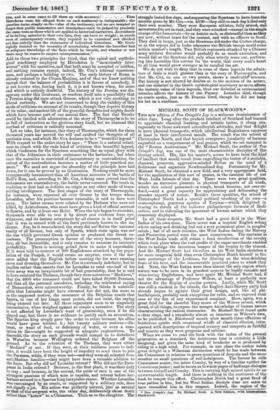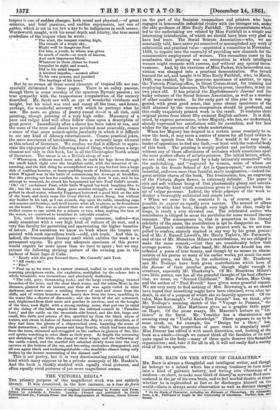MICHAEL SCOTT OF BLA.CKWOOD'S.*
THIS new edition of Tom Cringle's Log is a welcome reminiscence of other days. Long after the prudent intellect of Scotland had learned to appreciate classical learning and artistic tastes, it clung cou- rageously to those awkward schoolboyish attitudes, and that delight in mere physical transports, which intellectual Englishmen suppress at least in their intellectual moods. The result was the school of Christopher North, and that boyish overgrown jocularity of humour engrafted on a temperament of real genius, which we see rampant in the " Noctes Ambrosianse." Mr. Michael Scott, the author of Tom Cringle's Log, was one of the most characteristic disciples of this literary school. His, like his master's, seems to have been the kind of intellect that would result from engrafting the tastes of a sociable, classical, generous, aggressive-minded Briton on the mind of a frolicsome and sagacious Newfoundland dog. Fortunately for Mr. Michael Scott, he obtained a new field, and a very appropriate field, for the application of this sort of genius, in the nautical life of our West India Islands of that day. There were two great qualities, besides an excessive pleasure in physical transports of all kinds, which this school possessed—a rough, broad humour, not over-re- fined,—and a great capacity for appreciating and delineating the grander aspects of nature. Besides these qualities, the school of Christopher North had a special political teaching of its own—a contemptuous, generous species of Toryism which delighted in tearing to shreds all the hollower philanthropic formulas of Radi- calism, and in ridiculing the ignorance of *human nature which they commonly displayed. In all these respects Mr. Scott had a great field in the West Indies of his own-time. There never was a tropical English colony where eating and drinking had not a very prominent place in peoples' minds ; but of all such colonies, the West Indies during the Slavery and Protection period were the most conspicuous. The captains in the West India trade still retain a fond recollection of the revelry which took place when the vast profits of the sugar-merchants enabled them to indulge the luxurious temper of the tropics to the utmost. And Mr. Michael Scott had therefore in his West India sketches a far more congenial field than even Christopher North himself in the bare pasturage of the Lothians, for dilating on the wine-drinking feats of his hero, and the innumerable practical jokes to which they led. Next, the West Indies were then almost the only region where nature was to be seen in its grandest aspects by highly sociable and wine-loving Englishmen, and here again Mr. Michael Scott had, if not the advantage of Professor Wilson, at least a perfectly new theatre for the display of similar powers. Lastly, while Mr. Scott was still a resident in the islands, the English Anti-Slavery party had already begun to agitate their great design, and, like all phi- lanthropists, probably took exceptions for rules, and so exposed their case to the fire of any experienced assailant. Here, again, was a great field for the cheerful Tory scorn of the Wilson school, which loved, of all things, to expose the meagre knowledge of human nature characterizing the radical visionaries. So Michael Scott found quite a clear stage, and a popularity almost as immense as Wilson's own, as he published in Blackwood month after month these effusions of boisterous spirits with occasional whiffs of classical allusion, inter- spersed with descriptions of tropical scenery and tempests as faithful and minute as they were gorgeous and sublime. When we come to read the book with the tastes of the present generation as a standard, the boisterous tone is certainly a little fatiguing, and gives the same kind of headache as is produced by riding in a high wind. For example, in one place the author takes great delight in a Wilsonian distinction which he has made between his Conscience in relation to grave questions of deep sin and the same monitor on small questions of self-indulgence. The former he calls Conscience senior, the latter Conshy, by way of a familiar epithet for Conscience junior; and he treats us to whole pages of badinage-dialogue between himself and Conshy. This is carrying high animal spirits to an unwarrantable length. And there is nothing in the sentiment of the book to temper this effect. Christopher North had a great fund df true pathos in him, but his West Indian disciple does not seem to have resembled him in this respect. Indeed, the region of the • Ilmn Crisgk's Log. By Michael Scott. a New Edition, with illustrations. Blackwood.
tropics is one of sudden changes, both moral and physical,—of great miseries, and brief passions, and sudden enjoyments, not one of pathos, which is set in too low a key to be indigenous in such scenes. Wordsworth caught, with his usual depth and felicity, the true moral symbolism of the tropics when he wrote :
" The wind, the tempest roaring high, The tumult of a tropic sky, Might well be dangerous food For him, a youth, to whom was given So much of earth—so much of heaven, And such impetuous blood.
Whatever in these dimes he found Irregular in sight and sound, Did to his mind impart A kindred impulse,—seemed allied To his own powers, and justified * The beatings of his heart."
But by no means all these moral elements of tropical life are suc- cessfully delineated in these pages. There is no sultry passion, though there is some worship of the spurious Byronic passion ; no true sympathy with the tempestuous irregularities of the scenery described. Mr. Scott saw with an eye of wonderful vividness and insight, but his mind was cool and canny all the time, and hence, perhaps, the wonderful accuracy with which he portrays what he saw. He casts no gleam of poetry round it—it is all rich, cold painting, though painting of a very high order. Mummery of a poor and vulgar kind will often follow close upon a description of great power. Immediately after a slaver has been taken at sea, and the mass of the crew and slaves have perished most miserably, comes a scene of that mere animal-spirits jocularity in which it is difficult to see any kind of literary entertainment. Coarse practical jokes, the mere merriment of intoxication, form a curiously lane element in this school of literature. We confess we find it difficuA to appre- ciate the enjoyment of the following kind of thing, which forms a large element not only in this book, but in all the Christopher North school of literature. The scene is on a British sloop of war :
" Whereupon, without much more ado, he stack his legs down through the small hatch right over the breakfast-table, with the intention of de- scending, and the fink thing he accomplished was to pop his foot into a large dish of scalding hominy, or hasty-pudding made of Indian corn-meal, with which Wagtail was in the habit of commencing his stowage at breakfast. But this proving too hot for comfort, he instantly drew it out, and in his attempt to reascend, he struck his bespattered toe into Paul Gelid's mouth. ' Oh! oh !' exclaimed Paul, while little Wagtail lay back laughing like to die • but the next instant Bang gave another struggle, or wallop, like a pelloch in shoal-water, whereby Pepperpot borrowed a good kick on the side of the head, and down came the Great Ostrich, Aaron Bang, but without any feather in his tail, as I can avouch, slap upon the table, smashing cups and saucers and hominy, and devil knows what all, to pieces, as he floundered on the board. This was so absurd that we were all obliged to give uncon- trolled course to our mirth for a minute or two, when, making the best of the wreck, we contrived to breakfast in tolerable comfort."
Yet, such boisterous nonsense—vulgar nonsense, indeed—was really consistent with a very high kind of culture of its sort, and a very fine faculty for perceiving and appreciating the higher beauties of nature. For ourselves we know no book where the tropics are painted with such marvellous truth—cold, rich troth. And this is, indeed, the transcendent literary merit which entitles the work to a permanent repute. To give any adequate specimen of this power would require far more space than we have to spare ; but we may extract the following striking picture of the evening gun in the harbour of Saint Iago di Cuba: "'Ready with the gun forward there, Mr. Catwell,' said Yerk.
" All ready, sir. " r Fire!'
" Pent up as we were in a narrow channel, walled in on each side with towering precipitous rocks, the explosion, multiplied by the echoes into a whole broadside, was tremendous and absolutely deafening.
"The cold, grey, threatening rocks, and the large overhanging twisted branches of the trees, and the clear black water, and the white Moro in the distance, glanced for an instant, and then ill was again veiled in utter darkness, and down came a rattling shower of sand and stone from the cliffs, and of rotten branches and heavy dew from the trees, sparkling in the water like a shower of diamonds ; and the birds of the air screamed, and, frightened from their nests and perches in crevices, and on the boughs of the trees, took flight with a strong rushing noise, that put one in mind of the rising of the fallen angels from the infernal council in ' Paradise Lost;' and the cattle on the mountain-side lowed, and the fish, large and small, like darts and arrows of fire, sparkled up from the black abyss of waters, and swam in haloes of flame round the ship in every direction, as if they had been the ghosts of a shipwrecked crew' haunting the scene of their destruction ; and the gnanas and large lizards, which had been shaken from the trees, skimmed and struggled on the surface in glances of fire, like evil spirits watching to seize them as their prey. At length the screaming and shrieking of the birds, the clang of their wings, and the bellowing of the cattle ceased, and the startled fish subsided slowly down into the oozy caverns at the bottom of the sea, and becoming motionless disappeared, and all was again black and undistinguishable—the deathlike silence being only broken by the hoarse murmuring of the distant surf."
This is not poetry, but it is very discriminating painting of that kind which many suppose to be a private monopoly of Mr. Ruskin's. And the book is thickly studded with equally vivid pictures, and often equally vivid pictures of yet more magnificent scenes.































 Previous page
Previous page